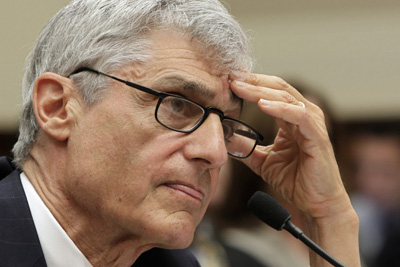In Broward County, Florida, 34,000 fathers and men took children to school on the first day of school last year. They may get 40,000 fathers and men this year. Why can't this happen in your city and in your community? It can! | | The 2010 Million Father March is managed by The Black Star Project, U.S.A. and sponsored by the Open Society Institute's Campaign for Black Male Achievement. |
Dr. Bell and Dr. McBride Co-Author Study on Prevention of Risky Behavior in Youth
"As a car with no brakes will certainly crash, the lack of emotional "brakes" often leads to harmful "accidents", such as addiction, premature pregnancies, violence, or sexually transmitted diseases. All through human history, human beings have continuously struggled with how to provide "brakes" for youth until they can regulate their own affect." Dr. Dominica F. McBride, Ph.D. | | | Is denial of evidence-based prevention a violation of human rights? By Dr. Carl C. Bell, M.D. and Dr. Dominica F. McBride, Ph.D. To deny someone their unchallengeable right is opposite, not only to what the US has established as part of being human but also to what has identified as unethical. The Declaration of Independence asserts, "We hold these truths to be self-evident, that all men are created equal, that they are endowed by their Creator with certain unalienable rights, that among these are Life, Liberty and the pursuit of Happiness." 1 Maintaining that undeniable human right to life is at the core of physicians' purpose and at the core to their professional existence. This maintenance of life involves both intervention and prevention; a physician's neglect in applying their knowledge and ability to prevent a symptom or disease process is accepted as unethical and, in some cases, illegal. Ethicists have argued that access to adequate medical care for diseases should be a right (i.e., an inherent, human allowance) and not a privilege (i.e., an earned and/or allocated allowance or advantage) 2, and preventing the start or progression of disease is a time honored anchor of their profession. Considering the robust findings identified in the recent National Research Council, National Academy of Science's Institute of Medicine 2009 prevention report 3, the authors propose that the denial or lack of application of prevention of mental disorders, substance abuse and problem behaviors to the general population is unethical and a violation of human rights. While some may perceive this statement bold, the authors argue that it matches with current ethical standards. The Hippocratic Oath states, "I will keep them [patients] from harm and injustice." This sentiment and ethic has been shown in various ways. Considering the reality that iodine prevents cretinism (a form of congenital hypothyroidism), we doubt if anyone would argue that it would be unethical not to put iodine in table salt. Similarly, considering the established fact that there are individuals who have a genetic risk for developing phenylketonuria (PKU), it would be unethical not to direct those individuals to restrict the amino acid, phenylalanine, from their diet. Further, while these are efficacious and effective biomedical technologies aimed at prevention, new research suggests that psychosocial technologies can be equally successful in preventing mental disorders, substance abuse, and problem behaviors in children, adolescents and young adults 3. Considering affect dysregulation leads to risky behaviors resulting in poor physical and mental health, there is strict scientific evidence supporting biotechnical and psychosocial interventions that increase affect regulation. Accordingly, to not provide prevention interventions that would strengthen "affect regulation" (i.e. the ability to prevent negative affective states from getting out of control 4) is unethical and a violation of human rights.
Modern developmental neuroscience informs us that youth are at a relatively high risk for lacking affect regulation, given the development of the brain. The central nervous system develops from bottom to up and from inside to out 3. As a result, the first part of the brain to develop is the limbic system, which regulates the survival systems of the brain. It engages the flight, fight or freeze behaviors in youth. Furthermore, the frontal lobes (the seat of judgment, reasoning, and wisdom in the brain) do not fully develop until about age 26 3. In other words, children, adolescents, and young adults' brains and ways of thinking are prone to being "all gasoline and no brakes." As a car with no breaks will certainly crash, the lack of emotional "breaks" often leads to harmful "accidents", such as addiction, premature pregnancies, violence, or sexually transmitted diseases. All through human history, human beings have continuously struggled with how to provide "brakes" for youth until they can regulate their own affect.
Sound scientific evidence indicates affect regulation is a powerful protective factor that prevents risk factors from being strongly predictive of poor physical and mental health 3. Strong evidence asserts there are effective prevention interventions to help young children 5, preadolescents 6, and adolescents 7 develop necessary social and emotional skills 8, e.g. optimal affect regulation. The Nurse-Family Partnership (NFP) 5 is a motivational intervention that works in supporting pregnancies and infant development. Olds, Sadler and Kitzman found that NFP improved pregnancy outcomes, maternal caregiving, and the maternal life course, preventing antisocial behavior. A meta-analysis of 60 home visiting programs reveals children who benefited from home visitation had better outcomes in three of five areas of children's cognitive and social-emotional functioning compared to controls 9. The Incredible Years program includes parent, teacher, and social training components that show examples of positive interactions and communications between parents and children, the value of praise and reward, and the use of time-out. These components have been extensively evaluated and found effective in treating children with conduct disorders and in preventing further aggressive behaviors 6. The Positive Parenting Program is a multilevel intervention. This program was tested on a population wide basis in Australia. This study revealed the intervention significantly reduced disruptive behavior and improved parent-child interaction. These changes resulted in significant reductions in the number of children with recognizable behavioral and emotional problems 10. Aban Aya 7 was a randomized control experimental prevention intervention designed to prevent risky behaviors of violence, provoking behavior, substance use, school delinquency, and early risky sexual activity. Compared to control participants, program participants experienced significant reductions in the rate of increase in negative behaviors between the 5th and 8th grade. The experimental limbs of the study revealed a decline in violence by 35% and 47%; provoking behavior by 41% and 59%; school delinquency by 31% and 66%; drug use by 32% and 34%; and recent sexual intercourse by 44% and 65% in the two experimental conditions of the study respectively. This research informed the Chicago Public Schools Violence Prevention Initiative that substantially decreased such behaviors in the entire school system 11.
We provide these concrete examples from the multitude of efficacious and effective examples in the 2009 IOM prevention report 3 to illustrate the reality that there are prevention intervention strategies that can prevent mental disorders, substance abuse, and problem behaviors. Now we raise the question about whether it is unethical to deny these services to the public.
Because affect dysregulation can be passed on from generation to generation creating a lasting stream of risky behaviors, failing to provide founded effective prevention intervention is unethical. We perceive this lack of action is the same as failing to provide a founded cure to a diseased patient. Just as physicians understand the ethics of preparing an HIV positive mother for a safe pregnancy and birth, we perceive the necessity for omnipresent prevention. We recognize that this span of prevention undoubtedly will have immense impact on future generations. Therefore, the failure to complete this task and acknowledge the unethical nature of neglecting prevention will eventually lead to more physical and mental health problems and, thus, premature sickness and death. Consequently, not providing prevention services is not only unwise and ill-advised, but also fundamentally unethical.
The sad reality is, when it comes to applying public health prevention science to prevent disorders stemming from a lack of affect regulation, such as violence, drug use, early sexual behavior, America is lagging behind. Dr. Julius Richmond, President Johnson and Carter's Surgeon General who helped "Head Start" become a significant US reality, proposed in order to institutionalize something you needed: a strong evidence-base that what you are putting in place works, a mechanism to adapt, disseminate, and implement the intervention, and, finally political will to do it 12. We have the science, health care reform could potentially provide the mechanism, and, the authors respectfully submit if we think of denying efficacious and effective prevention interventions to the US public as unethical, we may develop the political will.
References Declaration of Independence. 1776. http://www.ushistory.org/declaration/document/ United Nations. International Covenant on Economic Social and Cultural Rights. 1966. http://www2.ohchr.org/english/law/pdf/cescr.pdf National Research Council and Institute of Medicine. Preventing Mental, Emotional, and Behavioral Disorders Among Young People: Progress and Possibilities. O'Connell ME, Boat T, & Warner KE (Eds). Washington, DC: The National Academies Press, 2009 Brady SJ. Affect Regulation and the Development of Psychopathology. New York: Guilford Press, 2003. Olds, D.L., Sadler, L., and Kitzman, H. Programs for parents of infants and toddlers: Recent evidence from randomized trials. Journal of Child Psychology and Psychiatry,48(3/4), 355-391, 2007. Webster-Stratton, C., Reid, M.J., and Hammond, M. Treating children with early onset conduct problems: Intervention outcomes for parent, child, and teacher training. Journal of Clinical Child and Adolescent Psychology, 33,105-124, 2004. Flay, B.R., Graumlich, S., Segawa, E., Burns, J., Amuwo, S., Bell, C.C., Campbell, R., Cowell, J., Cooksey, J., Dancy, B., Hedeker ,D., Jagers, R., Levy, S.R., Paikoff, R., Punwani, I., and Weisberg, R. (2004). The ABAN AYA Youth Project: effects of comprehensive prevention programs on high-risk behaviors among inner city African American youth: A randomized trial. Archives of Pediatrics and Adolescent Medicine, 158(4), 377-384. Goleman D. Emotional Intelligence. New York: Bantam, 1995. Sweet, M.A., and Appelbaum, M.L. (2004). Is home visiting an effective strategy? A metaanalytic review of home visiting programs for families with young children. Child Development, 75, 1435-1456. Sanders, M.R., Ralph, A., Sofronoff, K., Gardiner, P., Thompson, R., Dwyer, S., and Bidwell, K. (2008). Every family: A population approach to reducing behavioral and emotional problems in children making the transition to school. Journal of Primary Prevention, 29, 197-222. Bell CC, Gamm S, Vallas P, Jackson P. Strategies for the Prevention of Youth Violence in Chicago Public Schools. In M. Shafii & S. Shafii (Eds). School Violence: Contributing Factors, Management, and Prevention. Washington, D.C., American Psychiatric Press, 2001, p. 251 - 272. Richmond JR, Fein R. The Health Care Mess: How We Got Into It and What It Will Take to Get Out. Cambridge, MA: Harvard University Press; 2005. Author Affiliations: Community Mental Health Council Inc and Institute for Juvenile Research, Department of Psychiatry, University of Illinois, Chicago, Illinois (Dr Bell); and Holism, Empowerment, Leadership, and Personhood (HELP) Institute, Huntsville, Alabama (Dr McBride). |
| Million Father March Makes New Zealand Press | | | Million Father March Will Help Stop Violence In American Schools On First Day And Every Day 800,000 Fathers and Men in 600 Cities Will Take Children to Schools on Their First Day Tuesday, 10 August 2010 - New Zealand
Chicago --Youth violence rages out of control in most major cities across America. Schools cannot control, communities cannot control and police cannot control youth violence. Stories of children maiming and killing other children dominate the news every day in too many American cities. Many students and out-of-school youth rob and fight other students and steal and vandalize properties near the schools. Instead of relying on police and further criminalizing American children, The Black Star Project's solution to youth violence in America is the Million Father March, which means involving a multitude of fathers and other connected and interested men in the continuing educational and social development of their children. American youth need male role-models and fathers to provide guidance and supportive discipline, and the marching fathers and other men of the Million Father March can provide this and do what the police have not done and cannot do -- bring peace to schools and communities across America. Last year, U.S. Secretary of Education Arne Duncan helped lead more than 625,000 fathers and men in 500 cities to take children back to school on the first day during the 2009 Million Father March. This year, more than 800,000 men in 600 cities will be taking their children to school on the first day for the 2010 Million Father March. In many communities, when fathers and men are at schools on the first day, the environment is orderly, productive and peaceful. When fathers and other men are absent from some schools on the first day or on any day, those schools tend to become disorderly, chaotic, violent and too often dangerous places for the students who attend these schools and the adults who work there. The Million Father March is the best way to regain that control and to establish a calm, productive, learning environment for students. Research shows that children whose fathers take an active role in their educational lives earn better grades, get better test scores, enjoy school more and are more likely to graduate from high school and attend college. Additionally, children have fewer behavior problems when fathers listen to and talk with them regularly and remain steadfastly active in their lives. Phillip Jackson, executive director of The Black Star Project said, "An effective father is part of an effective parent team that is critical to creating a strong family structure. And strong family structures produce children who are more academically proficient, socially developed and self-assured. Better parents also produce better communities, better schools, and better students with higher academic achievements. Such children become adults who are valuable assets to their communities." The Million Father March is not just a one-day event. It is a year-long commitment that men make to children and their families. This commitment includes volunteering at schools as mentors, tutors, coaches, janitors, chaperones and school-board members. The Million Father March also supportively encourages fathers to be active on weekends by taking their children to worship at churches, mosques and synagogues and to museums, cultural centers, hands-on science exhibits and athletic events. On the first day of school, the yearly Million Father March provides an escort of safety, support and encouragement to children of all ages. Gang recruitment, bullies and violence vanish any day that a group of men are present at schools. Participants in the March include fathers, grandfathers, foster fathers, stepfathers, uncles, cousins, big brothers, significant male caregivers and family friends. Although the Million Father March is created by Black men, women and men of all ethnicities are encouraged to participate by taking their children to school on their first day. We ask businesses to give fathers and other participating men two hours off from work that morning to take their children to school. And finally, we are making a special effort to coordinate Latino Fathers in La Marcha de los Padres 2010. Please either join the men in your city or help organize them to be part of the Million Father March 2010. ___________________________________________________________________________ The 2010 Million Father March is managed by The Black Star Project, U.S.A. and sponsored by the Open Society Institute's Campaign for Black Male Achievement. |
| Join Us in the Bud Billiken Parade | | August 9, 2010
Dear Supporter of The Black Star Project:
In the spirit of getting ready to return to school we are participating in the 2010 Bud Billiken Parade. This year's parade will take place on Saturday, August 14 2010. We are inviting all mentors involved in our school-based mentoring programs to march in the parade with us.
By participating in the parade you can help us to promote the programming of The Black Star Project. Members of The Black Star Project as well as participants from The Student Motivation/Mentoring Program, The Parent University, The Deborah Movement, the Fathers Club and other Black Star programs will be marching with us.
We ask that you join us from 9 A.M.-1 P.M. for this parade. If you are interested in representing Black Star, as you always do, please contact The Black Star Project at (773) 285-9600 or email blackstar1000@ameritech.net.
Finally, thank you for supporting The Black Star Project's in our continued effort to improve the educational standards for our youth and the communities in which we live.
Sincerely,
Phillip Jackson
The Black Star Project
|
I am sick and tired of being sick and tired!!!
Fannie Lou Hamer | | Activist and praying women are encouraged to join
The Deborah Movement on
Thursday, August 19, 2010, 6:30 pm
at
The Black Star Project
3509 South King Drive
Chicago, Illinois
For an event featuring
Dr. Carol Adams
President of The DuSable Museum of African American History
and
Muslim women who will talk about their lifes of faith, structure and commitment. |
| From the Mouth of Our Youth Comes the Truth about Disparities in Admissions and Education in the U.S. | | 17 Year Old Justin Hudson Challenges the Elite Hunter College High School in New York City to Be Fair in Admissions Justin Hudson used his graduation speech at Hunter College High School to challenge the admissions process for the school. (Photo by Michelle V. Agins/The New York Times) | Graduation Speech by Justin Hudson
Ladies and gentlemen, family, faculty and my fellow classmates of the class of 2010, before I begin I would like to thank those teachers who chose this modest speech among the outstanding collection of speeches written by my highly competent peers. I would also like to thank all the people who have expressed their support for me and their anticipation for this speech. To be told "You are the best person in the grade to give this speech", or some variation of that statement, more than once is truly humbling, and you all are either the most polite people I know, or the kindest people I know. It is a great honor to give this address, and I promise I do not take it lightly. I have chosen every word quite carefully because I am fully aware of the responsibility you all have bestowed upon me. Today, I stand before you as a personification of conflictedness. I find myself on this podium experiencing numerous warring emotions, and I am certain many of you here empathize with me on that point. Firstly, and perhaps most obviously, I am filled with a great sense of happiness and accomplishment. My peers and I have put much effort for the last six years-a third of our lives thus far-into being able to stand here today and say that we've earned the right to stand here. It was by no means easy, and there were many times when I thought I would not reach this finish line. But those struggles have only made this moment sweeter. The people who are on this stage survived four years of Latin, or 8th grade swim class, or English with Ms. D'Amico, or BC Calculus, or the 25% rule, and I think all of us can take some pride in that. Yet, my ambivalence on this day stems from the very fact that this ceremony is the end of an arduous journey. While I am ready to continue my academic endeavors, knowing that Hunter has thoroughly prepared me for them, I am also filled with a deep sense of anxiety and sadness. Hunter has been my second home for the last six years, and it has bordered on becoming my first home. Between my time diligently taking notes in the classroom, playing Chinese Poker in the hallway, taking a nap in the G.O. office, frantically rehearsing for a cultural show or theater production in the auditorium, cheering for an undefeated basketball team in the gymnasium, or simply sitting outside on the senior steps, listening to a boom box and enjoying nice weather in the courtyard, Hunter has truly become a sanctuary for me. My life has revolved around the fourstory brick building that stands on East 94th Street and Park Avenue, and Hunter's intimate class size means that I have become as connected to the people of this school as I have to the building itself. It may sound disingenuous to say that I will miss each and every one of you, but all of you in some small way have shaped me into the person I am today, so I thank you all for that. Of course, the comfort that I have attained at Hunter makes this departure a rather anxious one, but with anxiety comes excitement, and the end of this journey signifies the start of a brand new one. As I leave behind the warmth that I have experienced at Hunter to enter a vastly new and quite frightening terrain, I can only help but think back to the last time I was in this situation, as a fresh-faced, wide-eyed twelve-year old entering the foreboding, windowless Brick Prison for the first time. Every aspect of my life since that point has been overwhelmingly positive, so all my fears about what lies ahead are slightly tamed by the idea that I will at least come close to experiencing in my future what I have already experienced at Hunter. However, ladies and gentlemen, more than happiness, relief, fear or sadness, I feel a very strong emotion that I cannot ignore today. More than anything else, today I feel guilty. I feel guilty because I don't deserve any of this. And neither do any of you. We received an outstanding education at no charge based solely on our performance on a test we took when we were eleven year olds, or four year olds. We received superior teachers and additional resources based on our status as "gifted", while kids who naturally needed those resources much more than us wallowed in the mire of a broken system. And now, we stand on the precipice of our lives, in control of our lives, based purely and simply on luck and circumstance. If you truly believe that the demographics of Hunter represent the distribution of intelligence in this city, then you must believe that the Upper West Side, Bayside and Flushing are intrinsically more intelligent than the South Bronx, Bedford-Stuyvesant and Washington Heights, and I refuse to accept that. It is certainly not Hunter's fault that socioeconomic factors inhibit the educational opportunities of some children from birth, and in some ways I forgive colleges and universities that are forced to review eighteen year-olds, the end results of a broken system. But, we are talking about eleven year-olds. Four year-olds. We are deciding children's fates before they even had a chance. We are playing God, and we are losing. Kids are losing the opportunity to go to college or obtain a career, because no one taught them long division or colors. Hunter is perpetuating a system in which children, who contain unbridled and untapped intellect and creativity, are discarded like refuse. And we have the audacity to say they deserved it, because we're smarter than them. As students, we throw around empty platitudes like "deserve" and "earn", most likely because it makes us feel better about ourselves. However, it simply isn't the case. I know for a fact that I did not work as hard as I possibly could have, and I think the same is true for everyone on this stage. Nevertheless, people who work much harder than we ever could imagine will never have the opportunities that lie in front of us. I apologize if this is not the speech you wanted to hear, but you will have the rest of your lives to celebrate your accomplishments. I apologize if I have not inspired you, or uplifted you, but we have failed to inspire and uplift an entire generation of children. That being said, let me make it very clear that I am not giving anyone here a moral lecture, for I am as complicit in the system we are a part of as anyone else in this room. If anything, I only make these remarks to further emphasize how much Hunter has meant to me, because I am acutely aware of where I would be now without it. As recipients of fortune, we more than anyone else should be able to understand and respect what our high school experience has meant to us, and has done for us. My guilt ultimately stems from my awareness of the academic, social, emotional and psychological tools that Hunter has blessed us with. Therefore, I believe the best way to assuage this guilt is to use those fortuitous tools to not only better myself, but also improve the society that surrounds us outside these oh, so narrow walls. I do not know the capacity in which I will be able to make this world a better and more just place, but I strongly believe that education is the most effective means of creating social improvement, which is precisely why this is a battle we cannot concede. My experiences at Hunter have left me with one final emotion; the last sentiment I will share with you today is hope. I hope that I will use the tools that Hunter has given me as a means to provide opportunities to others, not out of a sense of paternalistic philanthropy, but out of a sense of duty to give to other people what Hunter has given to me. I also hope that you all will do the same, in whatever way you see fit. Even more so, I hope that in the near future, education itself will not be a privilege for the few in this world. I hope that a quality education will not be a privilege for the few in this country. I hope that the Hunter community will descend from its ivory tower made of brick, and distribute its tools evenly to the mass of humanity that is the City of New York. I hope that, despite its problems, Hunter can prove to be the rule, and not the exception, to what can exist as a school. Finally, I hope from the bottom of my heart that someday a class speaker can stand on this podium and look into an audience of his closest and dearest friends whom he never would have met without Hunter and whom he'll never forget, an audience of faculty members he has a deep respect and admiration for, an audience of family members who have supported him throughout his entire life without asking for anything in return. I hope this child can stand on this very stage, look at the most important people in his life, and feel happy, sad, relieved, scared, accomplished or whatever his heart desires, without feeling guilty about a damn thing. Thank you for your time. |
Click on links below for more information about the great programs of The Black Star Project | | For more information on our other programs and how you can get involved, click on these links below or please call 773.285.9600: |
| | | | | | | |
The Black Star Project | 3473 South King Drive, Box 464 | Chicago | IL | 60616 | 
|

























